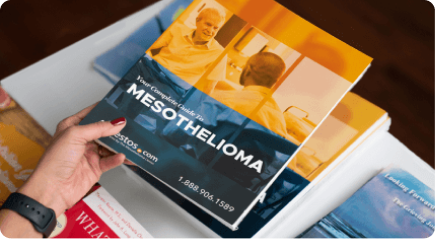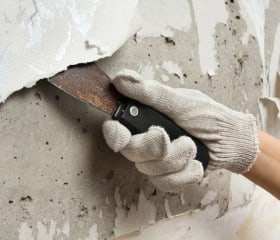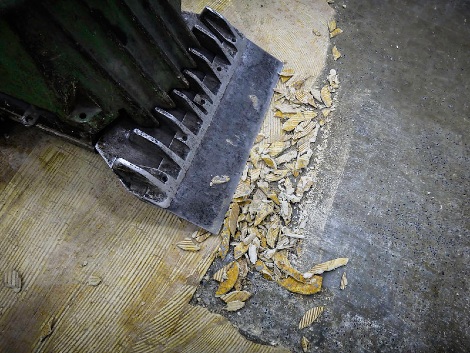

Many vinyl products were made with asbestos before the 1980s. Manufacturers added the mineral to vinyl wallpaper, siding, flooring and gaskets to boost their heat resistance. Some workers exposed to asbestos in vinyl products developed diseases such as mesothelioma.

Many brands of vinyl wallpaper, floor tiles, sheet flooring and old siding were made with asbestos for its durability and heat resistance. Some vinyl products didn’t contain asbestos but were contaminated with asbestos backings and adhesives.
Several manufacturers phased out using the mineral in their products as the public became more aware of the health risks associated with asbestos exposure. Older homes and buildings may still contain legacy asbestos vinyl products, and people may encounter them when salvage or vintage shopping.
Vinyl Products That Contained Asbestos
Some asbestos vinyl gaskets are still in use. However, the Biden administration in 2024 finalized the U.S. Environmental Protection Agency’s final rule banning ongoing uses of one specific type of asbestos, chrysotile, which “bans most sheet gaskets that contain asbestos.” Some gaskets used in nuclear power plants are allowed to continue to use asbestos for safety reasons, but these gaskets aren’t vinyl products.
Some people may worry their vinyl records contain asbestos. Production of vinyl records began in the 1930s when asbestos was heavily used in many industries. But asbestos wasn’t added to vinyl records. Early records from the late 19th and 20th centuries were lacquer. These lacquer records were made from asbestos and shellac.
Goodyear and Sears-Roebuck and other manufacturers have produced vinyl products containing asbestos for decades. Many of these companies made asbestos vinyl wallpaper and flooring.
People used these products in homes, schools and buildings across the country. Some companies also created more than one type of vinyl product with asbestos.
Manufacturers of Asbestos Vinyl Products
Bird Corporation and Celotex Corporation produced asbestos vinyl siding. After Bird Corporation faced hundreds of asbestos lawsuits, it phased out asbestos in its products. Other companies faced lawsuits about asbestos exposure as well.
Many companies that went bankrupt as a result of lawsuits set up asbestos trust funds. These funds set aside money for future claims from those who developed an asbestos-related disease. An experienced attorney can help you determine if you’re eligible to file a trust fund claim or an asbestos lawsuit.


Damaged or aging vinyl products that contain asbestos can release tiny toxic fibers into the air. Inhaling asbestos fibers can cause them to stick in the lining of the lungs. This may lead to inflammation or scarring. Over time, this can cause diseases like mesothelioma, asbestosis or lung cancer.
Registered nurse and oncology writer at The Mesothelioma Center, Sean Marchese, says, “Asbestos fibers trapped in the body for long periods of time can damage cells. The DNA in those cells becomes damaged over time, which can lead to the formation of cancer.”
Studies show asbestos exposure can also happen from normal use of asbestos-containing vinyl products. For example, vinyl flooring can break down from normal wear and tear or maintenance, releasing asbestos fibers.
Those who have handled asbestos vinyl every day are most at risk for exposure and developing an asbestos-related disease. This particularly includes those who manufactured or installed vinyl asbestos products.
Today, those who still work with asbestos vinyl gaskets are at risk. People who maintain or remove legacy asbestos vinyl wallpaper, siding or flooring are also at a higher risk. This risk affects not only professionals but also do-it-yourself home renovators.
People at Risk of Asbestos Exposure
If you have a history of asbestos exposure, finding a doctor with experience with accurately diagnosing and treating diseases like mesothelioma and asbestos lung cancer can help. Finding signs of lung damage or the development of cancer early often affords patients more treatment options, resulting in better outcomes.
Manufacturers have paid millions of dollars in mesothelioma compensation to plaintiffs in successful personal injury and wrongful death lawsuits. Most asbestos cases end in settlement before ever getting to trial. Compensation can help with lost income, medical bills, or other unexpected costs from an asbestos-related disease.
Notable Asbestos Vinyl Product Verdicts and Settlements
The 2024 Mealey’s Litigation Report shows the average verdict for an asbestos lawsuit is $20.7 million. An average asbestos settlement ranges from $1 million to $2 million. Any compensation you might receive will depend on the details of your individual case. A mesothelioma attorney can help you file a claim and build a case if you’ve been exposed to asbestos in vinyl products.

Get help finding a top attorney who can get you the compensation you deserve.
Get Help Now
You can’t see asbestos in vinyl products such as flooring, wallpaper or siding. If you think a product has asbestos, call a licensed abatement professional for testing and removal. Licensed experts must follow all local, state and federal guidelines for asbestos disposal.
If removal isn’t possible, you can have asbestos encapsulated. This seals the materials and helps keep harmful fibers from becoming airborne. Encapsulation can be a cheaper option than removal. The encapsulation process uses spray or brush methods on materials that contain asbestos. This helps lower the risk of exposure. A trained professional must handle asbestos encapsulation.
DIY home renovation projects can expose you to asbestos. Removing older vinyl wallpaper, siding or flooring tiles can be risky. These projects can release harmful asbestos fibers into the air you and your family breathe.
Recommended ReadingYour web browser is no longer supported by Microsoft. Update your browser for more security, speed and compatibility.
If you are looking for mesothelioma support, please contact our Patient Advocates at (855) 404-4592
The Mesothelioma Center at Asbestos.com has provided patients and their loved ones the most updated and reliable information on mesothelioma and asbestos exposure since 2006.
Our team of Patient Advocates includes a medical doctor, a registered nurse, health services administrators, veterans, VA-accredited Claims Agents, an oncology patient navigator and hospice care expert. Their combined expertise means we help any mesothelioma patient or loved one through every step of their cancer journey.
More than 30 contributors, including mesothelioma doctors, survivors, health care professionals and other experts, have peer-reviewed our website and written unique research-driven articles to ensure you get the highest-quality medical and health information.
My family has only the highest compliment for the assistance and support that we received from The Mesothelioma Center. This is a staff of compassionate and knowledgeable individuals who respect what your family is experiencing and who go the extra mile to make an unfortunate diagnosis less stressful. Information and assistance were provided by The Mesothelioma Center at no cost to our family.LashawnMesothelioma patient’s daughter


Rodgers, T. (2025, June 10). Asbestos in Vinyl Products. Asbestos.com. Retrieved June 30, 2025, from https://www.asbestos.com/products/vinyl-products/
Rodgers, Travis. "Asbestos in Vinyl Products." Asbestos.com, 10 Jun 2025, https://www.asbestos.com/products/vinyl-products/.
Rodgers, Travis. "Asbestos in Vinyl Products." Asbestos.com. Last modified June 10, 2025. https://www.asbestos.com/products/vinyl-products/.
An occupational scientist or another expert who specializes in occupational hazards reviewed the content on this page to ensure it meets current scientific standards and accuracy.
Sean Fitzgerald, PG, is a research geologist specializing in asbestos environmental studies.
Our fact-checking process begins with a thorough review of all sources to ensure they are high quality. Then we cross-check the facts with original medical or scientific reports published by those sources, or we validate the facts with reputable news organizations, medical and scientific experts and other health experts. Each page includes all sources for full transparency.
Please read our editorial guidelines to learn more about our content creation and review process.
